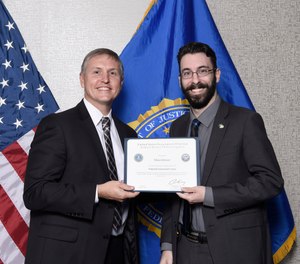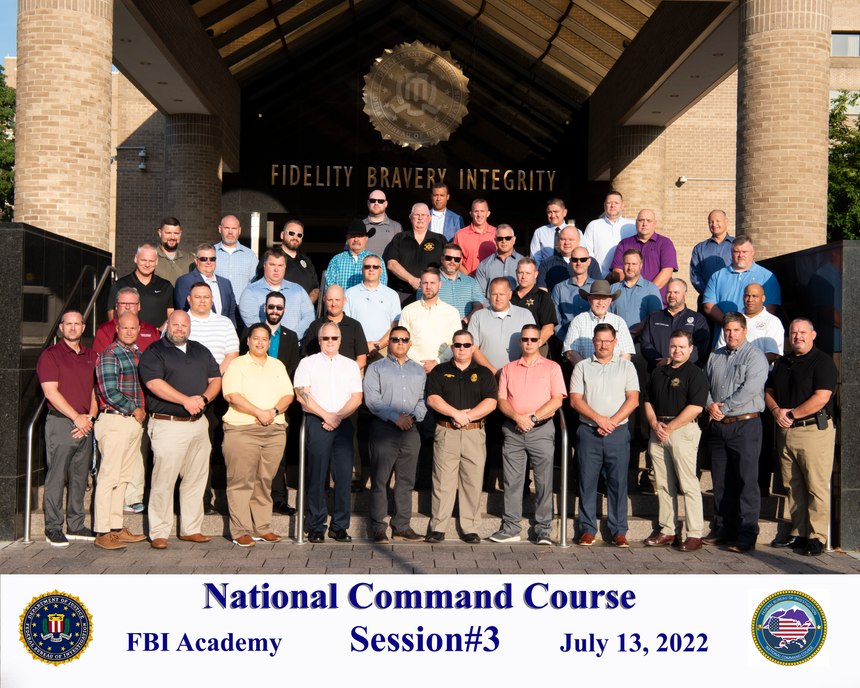By Chief Ethan Johnson
From July 11-15, I attended the third session of the FBI's National Command Course in Dumfries, Virginia, outside of Quantico.
The National Command Course is the newest program in the FBI’s executive development repertoire and was crafted for agency heads with fewer than 50 sworn officers who have not attended the FBI National Academy.

The course mirrors the FBI’s National Executive Institute, which is designed for agency heads with departments larger than 500 sworn officers, and the Law Enforcement Executive Development Seminar, which is designed for agency heads with departments of between 50-500 sworn officers.
Small agency leadership training
According to the Bureau of Justice Statistics, 86% of law enforcement agencies in the nation have fewer than 50 officers. Knowing there was a need for smaller agency heads to receive the same quality training as larger agency leaders, the FBI developed the National Command Course.
I found out about the course when it began last year after my local FBI office asked if I’d be interested in attending. I jumped at the chance and found myself a few months later in a cozy conference room in a hotel in Dumfries, Virginia. The application process was straightforward, and the FBI pays for the costs associated, relieving the burden on small training budgets.
National Command Course itinerary: What to expect
Day 1: The first day involved introductions and getting to know the chiefs and sheriffs attending from across the country, as well as discussing our issues and sharing solutions to those issues.
Day 2: On the second day we toured Mount Vernon. I was spellbound by the majesty of the manicured grounds and sloping hills that give way to the steady currents of the Potomac and felt that view across the majestic river was worth a dozen sunsets.
While there we took part in the "Be Washington" experience, an interactive scenario in which attendees are presented with a challenging leadership choice Washington also faced and asked to make a decision. Our class made the same choice as Washington by a slim margin.
Day 3: On the third day we toured the FBI Academy and National Academy at Quantico and attended several classes on different programs and services the FBI offers to assist agencies such as ballistics research, forensics, defensive tactics and hostage rescue.
Day 4: On the fourth day we heard from retired General John Kelly who served as the commander of the U.S. Southern Command under the Obama administration and the Secretary of Homeland Security and Chief of Staff under the Trump administration. This legend imparted his leadership pearls of wisdom in a frank manner challenging everyone in the room to lead by example, not tolerating thoughtless disparaging comments from supervisors, peers and subordinates alike.
That evening we headed to the National Museum of the Marine Corps, whose lofty spire I had witnessed on my way in. When we arrived, we received a brief tour depicting the heroism of the Corps throughout its existence, consisting of world-class exhibits including the legendary flag flown on Iwo Jima. We had dinner in the museum at the Tun Tavern, an inspiration from the original Tun Tavern in which the Marine Corps was founded in 1775.
Day 5: On the fifth and final day we heard from several more instructors and touched on personal stories about officer wellness as we shared the collective ache of our personal and professional lives.
We ended that evening with a graduation celebration and saying our goodbyes. A new nonprofit association has been initiated by the first class called the National Command Course Association and we were all invited to join the association and its Facebook group. In addition to the certificate given at graduation, the FBI also mails a large frame and certificate to attendees a few weeks later.
Throughout the week we heard from many FBI National Academy instructors speaking on myriad topics from emotional intelligence to firearms and body armor. The FBI staff – Supervisory Special Agent and Program Manager Jim Moore, Management and Program Analyst Stephanie Crossley, and Management and Program Analyst Tina Jaskiewicz – were amazing. They were always helpful and focused on receiving attendee feedback so they can improve their courses. I was most impressed with the Google map Stephanie sent a few weeks before the class depicting each participant’s police agency as a pin on the map to let attendees where our classmates were located before coming to class. Jim noted that they plan to run two National Command College cohorts per year due to high demand and you can apply through your local FBI office.
Leadership lessons
From this experience, I brought back a renewed focus on developing the caliber of leadership among those in my agency.
From many individuals, I learned methods of knowing when to delegate more, as well as when to disconnect from your agency, which I have found particularly hard to do as agency heads often feel a strong sense of ownership and keen responsibility for everything involving our agency.
Throughout the week I felt everyone in the room comprehended and commiserated with the struggles of the small agency, particularly when it comes to a lack of resources and having fewer officers with the training and bandwidth to take on additional tasks and initiatives.
I’m certainly biased in believing that small agencies are some of the best to work for as change and progress can be made swiftly when there are fewer internal moving parts.
Throughout the week I came to believe that without community engagement with these small departments we could not exist or flourish in the way we do. The stories flooded in from around the room (and across the country) about positive community interactions and how donations and volunteers help police departments fulfill their missions.
It is said so often that it has become cliché, but no truer words were spoken than by Sir Robert Peel when he noted, “The police are the public and the public are the police.” These agencies exemplify this sagacious prose as it holds current today and throws down the gauntlet challenging us to aspire to meet this mandate.

About the author
Ethan Johnson is chief of police for Coastal Pines Technical College in Waycross, Georgia. Ethan recently began pursuing his Doctorate in Public Administration Degree at Valdosta State University.
"course" - Google News
August 10, 2022 at 02:46AM
https://ift.tt/MIlUR0Q
What I learned from attending the FBI's National Command Course - Police News
"course" - Google News
https://ift.tt/IgCNJrl
https://ift.tt/aPn3wTY
Bagikan Berita Ini














0 Response to "What I learned from attending the FBI's National Command Course - Police News"
Post a Comment